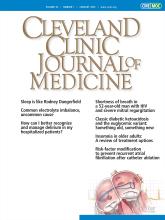Article Figures & Data
Tables
Hypertension Diabetes mellitus Dyslipidemia Obesity Obstructive sleep apnea Metabolic dysfunction–associated steatotic liver disease Smoking Alcohol consumption Physical inactivity - TABLE 2
Summary of evidence surrounding preablation and postablation risk-factor modification
Risk factor Before the procedure After the procedure Hypertension Hypertension increases incidence of atrial fibrillation5
Periprocedural renal denervation reduces blood pressure and atrial fibrillation recurrence12
Whether aggressive hypertension management before ablation provides additional benefit in preventing atrial fibrillation recurrences is unclear11Hypertension increases postprocedural atrial fibrillation recurrence risk8
Rates of recurrence in patients with controlled hypertension are similar to those of patients with no hypertension9Diabetes mellitus Diabetes mellitus increases incidence of atrial fibrillation15
Periprocedural role of sodium-glucose cotransporter 2 inhibitors is unclearHemoglobin A1c control reduces atrial fibrillation recurrence18 Obesity Obesity increases both incidence and severity of atrial fibrillation29,30
Preprocedural weight management, including bariatric surgery, improves success33–35,38Obstructive sleep apnea Continuous positive airway pressure reduces atrial fibrillation recurrence in patients with obstructive sleep apnea43,44 Metabolic dysfunction–associated steatotic liver disease Preprocedural management is beneficial46
Role of pharmacotherapy is unclear






